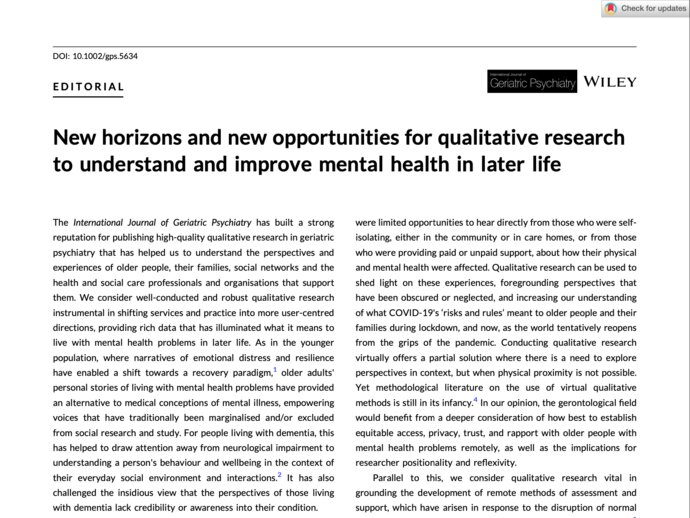New horizons and new opportunities for qualitative research to understand and improve mental health in later life
Dr Vanessa Lawrence, Director of the QUAHRC at King's and Associate Editor for Qualitative Research for the International Journal of Geriatric Psychiatry, recently published an editorial highlighting the primary role of qualitative research in helping us to understand and improve the mental health of older people.
Dr Lawrence said, “The purpose of this editorial is primarily to celebrate the role qualitative research has played in advancing research and practice relating to dementia and the wider field of mental health in older people, and the new opportunities afforded by innovative and participatory methods.”
Written with the support of Professor John Keady and Dr Kritika Samsi, Dr Lawrence highlights that qualitative research can be used to shed light on the experiences of people that might otherwise be overlooked. Dr Lawrence is clear as to why qualitative research has such an important role to play.
Increasingly we are seeing that creative methods like walking interviews and visual methods are effectively engaging older people as active partners in the research process
“Listening to the voices of those with lived experience of a condition is an invaluable part of understanding how it affects their lives. Taking dementia as an example, we can see that people living with the illness are able to provide perspectives and insight into their everyday interactions and experiences that quantitative data would not provide. Increasingly we are seeing that creative methods like walking interviews and visual methods are effectively engaging older people as active partners in the research process, which in turn enhances the utility and robustness of qualitative research”.
Further to this, the editorial argues that journals can help to promote high quality qualitative research through allowing authors space to elaborate on research procedures and context and through using appropriate quality criteria that are specific to the methodological approach. The editorial announces that the International Journal of Geriatric Psychiatry has increased its word limit to 6000 words for original qualitative research. The journal welcomes submissions that seek to engage and represent the authentic voice of older people using the full range of qualitative approaches.
New horizons and new opportunities for qualitative research to understand and improve mental health in later life (Vanessa Lawrence, Kritika Samsi, John Keady) was published in the International Journal of Geriatric Psychiatry.

